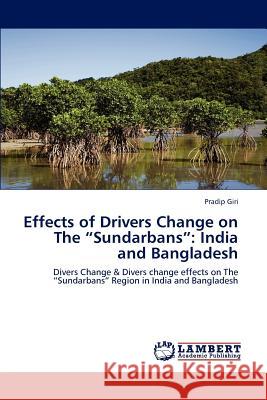Effects of Drivers Change on The Sundarbans: India and Bangladesh » książka
Effects of Drivers Change on The Sundarbans: India and Bangladesh
ISBN-13: 9783844398960 / Angielski / Miękka / 2012 / 740 str.
Effects of Drivers Change on The Sundarbans: India and Bangladesh
ISBN-13: 9783844398960 / Angielski / Miękka / 2012 / 740 str.
(netto: 337,33 VAT: 5%)
Najniższa cena z 30 dni: 354,20 zł
ok. 10-14 dni roboczych
Bez gwarancji dostawy przed świętami
Darmowa dostawa!
The prominent ecosystem of the Sundarbans Biosphere Reserve includes the Tropical humid forest and the mangroves. The Mangrove species include Bruguiera gymnorrhiza, Avicennia alba, Ceriops tagal and Rhizophora apiculata. 25 species of mangroves, 120 species of algae and 124 species of Angiosperms are found here. The rare species of plants found here are Nypa fruiticans (Nipah palm), Sonneratia Alba (Mangrove apple), Acanthus volubilis (Acanthe molle), Aegialtis rotundifolia (Nilar ixora manila), Soneratia casaeolaris (Crabapple mangrove), Heritiera fomes (Sundari), Xylocarpus granatum (Cannonball mangrove), Ceriops tagal (Tagal mangrove) and Lumnitzera recemosa (Sandy mangrove). CO2 and other pollutants from air and water which makes the surrounding environment free from pollution.Finally, Divers change risks should also not distract from aggressively addressing other critical threats, including shrimp farming, illegal felling of trees, poaching of wildlife, and oil pollution from barge traffic, that might already critically threaten the fragile ecosystems such as the Sundarbans even before significant climate change impacts manifest themselves.
The prominent ecosystem of the Sundarbans Biosphere Reserve includes the Tropical humid forest and the mangroves. The Mangrove species include Bruguiera gymnorrhiza, Avicennia alba, Ceriops tagal and Rhizophora apiculata. 25 species of mangroves, 120 species of algae and 124 species of Angiosperms are found here. The rare species of plants found here are Nypa fruiticans (Nipah palm), Sonneratia Alba (Mangrove apple), Acanthus volubilis (Acanthe molle), Aegialtis rotundifolia (Nilar ixora manila), Soneratia casaeolaris (Crabapple mangrove), Heritiera fomes (Sundari), Xylocarpus granatum (Cannonball mangrove), Ceriops tagal (Tagal mangrove) and Lumnitzera recemosa (Sandy mangrove). CO2 and other pollutants from air and water which makes the surrounding environment free from pollution.Finally, Divers change risks should also not distract from aggressively addressing other critical threats, including shrimp farming, illegal felling of trees, poaching of wildlife, and oil pollution from barge traffic, that might already critically threaten the fragile ecosystems such as the Sundarbans even before significant climate change impacts manifest themselves.











